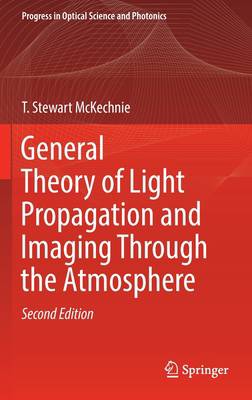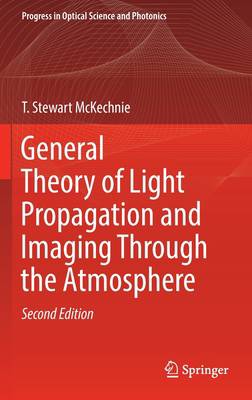
- Retrait gratuit dans votre magasin Club
- 7.000.000 titres dans notre catalogue
- Payer en toute sécurité
- Toujours un magasin près de chez vous
- Retrait gratuit dans votre magasin Club
- 7.000.0000 titres dans notre catalogue
- Payer en toute sécurité
- Toujours un magasin près de chez vous
General Theory of Light Propagation and Imaging Through the Atmosphere
T Stewart McKechnieDescription
This 2nd edition lays out an updated version of the general theory of light propagation and imaging through Earth's turbulent atmosphere initially developed in the late '70s and '80s, with additional applications in the areas of laser communications and high-energy laser beam propagation. New material includes a chapter providing a comprehensive mathematical tool set for precisely characterizing image formation with the anticipated Extremely Large Telescopes (ELTS), enabling a staggering range of star image shapes and sizes; existing chapters rewritten or modified so as to supplement the mathematics with clearer physical insight through written and graphical means; a history of the development of present-day understanding of light propagation and imaging through the atmosphere as represented by the general theory described. Beginning with the rudimentary, geometrical-optics based understanding of a century ago, it describes advances made in the 1960s, including the developmentof the 'Kolmogorov theory, ' the deficiencies of which undermined its credibility, but not before it had done enormous damage, such as construction of a generation of underperforming 'light bucket' telescopes. The general theory requires no a priori turbulence assumptions. Instead, it provides means for calculating the turbulence properties directly from readily-measurable properties of star images.
Spécifications
Parties prenantes
- Auteur(s) :
- Editeur:
Contenu
- Nombre de pages :
- 678
- Langue:
- Anglais
- Collection :
- Tome:
- n° 20
Caractéristiques
- EAN:
- 9783030988272
- Date de parution :
- 07-10-22
- Format:
- Livre relié
- Format numérique:
- Genaaid
- Dimensions :
- 156 mm x 234 mm
- Poids :
- 1170 g

Les avis
Nous publions uniquement les avis qui respectent les conditions requises. Consultez nos conditions pour les avis.






